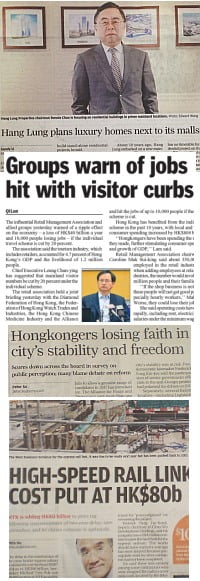Ronnie says: “Please be nice to Mainlanders so I can push rents up – thanks!” Sensing we may not be persuaded, he adds: “You’ll change your minds when you’re all starving and unemployed.” The Hang Lung heir then goes back to his incredibly 15-years-ago core strategy as a property developer: building luxury residential projects  next to high-end malls in Chinese cities. What vision.
next to high-end malls in Chinese cities. What vision.
As well as being invited to freak out at the prospect of Occupy Central laying Hong Kong to waste, we must now panic about the proposal to limit Mainland shoppers’ visits to the city. Specifically, we are supposed to recoil in horror at the thought that such a move would ‘directly affect the retail industry’. The government demands that we love and cherish the gold shops, the handbag stores and the inane fashion brands, as if they were the last handful of pangolins or pink dolphins.
We can dispense with the scare stories. Mass-closures of luxury outlets would reduce rents and open up opportunities for local entrepreneurs to create jobs and diversify the retail part of our economic base. A cut in Mainland shoppers would on balance strengthen Hong Kong’s economy, and certainly improve residents’ quality of life. Let’s ‘directly affect’ the luxury stores to death.
The main beneficiaries of the Mainland-shoppers phenomenon are landlords, notably the big property tycoons who own the major malls and much of the distribution and related activities. When our officials stress the importance of defending the ‘retail industry’, this is who they mean.
Why do they attach so much more importance to this relatively small interest group than the other 7 million people?
One possible reason is that the rogues are on the take. The tycoons slip the bureaucrats little red envelopes or promises of consulting jobs in retirement, and in return they get preferential policies. With a court case hearing accusations of just this sort currently in progress, we can’t exactly rule it out.
Another possibility – actually, more of a fact – is a structural bias towards collusion. It’s no secret that the land system makes tax farmers out of property developers, and that land revenues are systematically recycled through bureaucratic empires into public works projects that benefit tycoon-owned construction interests. It’s an elaborate redistribution of wealth that starts in your pocket and ends up… in someone else’s.
It is also extremely likely that sheer stupidity plays a part. Hong Kong civil servants are not renowned for their grasp of economics. Their attitudes toward tourism and other policy areas (like the cretinous Capital Investment migrant scheme) suggest they are besotted by simplistic notions of ‘bringing money into Hong Kong’. The idea that such flows of cash might just zip through the economy to no net effect, or stay but create dangerous distortions, is apparently beyond them. The vested interests aren’t about to enlighten them.
Conspiracy theorists – or should we say hardened, cynical, ultra-realists – have a fourth explanation. A Hong Kong being swamped with Mainland visitors (not to mention the steady inflow of family-reunion arrivals) is a Hong Kong that starts speaking Mandarin just to save time and otherwise adapts, or submits to ‘integration’. High rents limit opportunities for creative enterprise and reduce the work force to docile servers of tourists, as in nice, obedient Macau. The city gains a body of ‘volunteers’ in its midst to bolster anti-Occupy and other campaigns. The commercial interests would have no qualms about selling their souls and their home town. And thus the troublesome foreign-influenced city that threatens Communist Party rule is neutered.
Suspicions that this is what Beijing intends are widespread. To many, the main uncertainty is whether people will fight back against ‘locusts’ or just resign themselves to the inevitable. Maybe that is what officials will be trying to gauge when deciding what limits to impose on Mainland visitors, if any.
